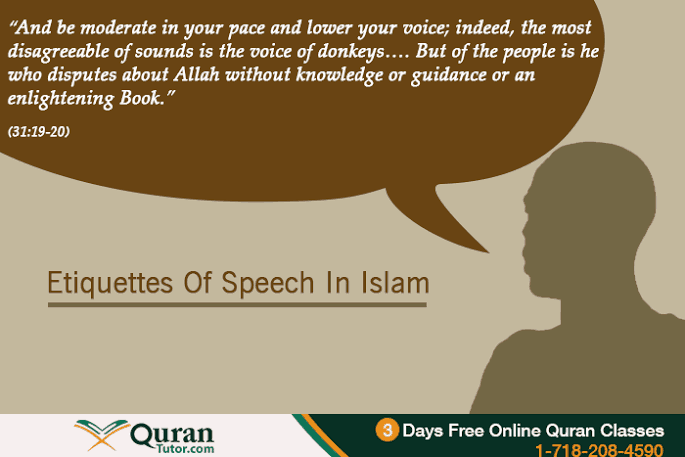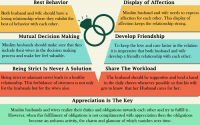Top Five Etiquettes and Rules of Speech in Islam
On contrary to the common notions and misconceptions about Islam as per which people believe that It is a tedious religion, which has nothing to offer other than, strict religious obligations and rituals, Islam in actual is a code of life and addresses matter related to each and every single aspect of life.

Besides other major matters related to living, one of the important aspects upon which Islam sheds light is the matter of speech. The speech of a person represents the kind of intellect and character he or she has, therefore, the more refined and polite the speech is the better is thought of that person. The lines below discuss the major etiquettes of speech in the light of Islamic teachings.
Etiquette#1:
In Quran, Allah Almighty says:

“And when the foolish address them (with bad words) they reply back with ‘Salamaa’ (peaceful words of gentleness).” (25:63)
From this ayah of Quran, one of the major characteristics of the speech of Muslims is clear. It is that they don’t respond bad words with bad words, rather they make peace with such people and avoid indulging with them in vain conversations that lead to nothing but foolishness and lack knowledge of any kind. Therefore, a Muslim must refrain from indulging in conversation with foolish people, respond to their bad words with gentleness, and go their own path.
At another place the same idea is asserted by Allah Almighty in Quran in the following way:
![]()
“If they pass by some vain speech or play, they pass by it with dignity.” (25:72)
Therefore, instead of becoming vain and foolish with vain and foolish people, a Muslim must refrain from them and make excuse with gentle speech.
Etiquette# 2:
In Quran, Allah Almighty says:

“And be moderate in your pace and lower your voice; indeed, the most disagreeable of sounds is the voice of donkeys…. But of the people is he who disputes about Allah without knowledge or guidance or an enlightening Book.” (31:19-20)

This ayah points out two thing related to firstly with speech and secondly with discourse. At first Allah Almighty instructs Muslims to be moderate in their pace of talking and keep their voices low. These two are perhaps the most important elements that at present are considered the best form of speech. If a person does not do so, then the his or her voice is as annoying as of a donkey, which no one likes.
The second thing that this ayah highlights is the elements that need to be taken care of before indulging in a religious discourse. One is as annoying as that of a donkey, if one indulges in religious discourse, primarily related to Allah Almighty without having any knowledge or guidance. Therefore, in addition to being gentle in speech, a Muslim also needs to refrain from religious discussions without any prior knowledge.
Etiquette# 3:
Prophet Muhammad (PBUH) said in His hadith:
“He who gave up disputing while he is right, a palace of high rank in Paradise will be built for him. He who gave up disputing while he is a fabricator, a palace in the center of Paradise will be built for him.” (Tirmidhi)
Indulging in disputes is one of the major speech problems observed in discourses of people. Regarding different matters people indulge in dispute and in that dispute all they try is to prove them right and the other person wrong. In doing so they neither take into consideration gentleness, nor do they take care of any civility, rather everything is lost and only their proving of themselves as right matters for them. This is why Prophet (PBUH) has put such a great reward for those who give up in a dispute and remain civil. This abhorrence of dispute is mentioned in another hadith as well, where Prophet (PBUH) said:
“There are no people who went astray after having been guided except for indulging in disputation.” (Tirmidhi)
Etiquette# 4:
Prophet Muhammad (PBUH) said:
“The one initiating abuse incurs the sin of abusing as long as the other did not return it.” (Muslim)
Abusing others has become a part of conversation of people of today. Even the most civil ones abuse or curse as a fashion and consider it something good in their speech. Islam condones such an act and the hadith shows that the person who abuses the other carries all the sin until the other one also reciprocates in the same way, which is when they share the sin.
At another place, Prophet Muhammad (PBUH) said:
“The believer does not defame, abuse, disparage, nor vilify.” (Tirmidhi)
All the elements mentioned in this hadith are associated with speech, therefore, a speech of a good Muslim must be free of all sorts of defaming, abusing or disparaging of others. Hence, condescending on others must be avoided in speech.
Etiquette# 5:
The fifth factor that a Muslim must refrain from in speech is anger. When anger is present in a speech, the ultimate result is a person loosing grip of senses as well as clouding the judgment, which ultimately leads to an uncivil speech and false judgment. Prophet Muhammad (PBUH) said:
“He who is victorious over his passion at the time of anger is the strongest among you. He who forgives having the power to release (his anger and take revenge) is the most patient among you.” (Bai-Haqqi)
Therefore, it is imperative that a Muslim when in conversation with others should control his or her anger and try not acting or responding out of anger as it leads to nothing but shame and misery. Hence, anger should be controlled and eliminated from speech. Further, you can checkup with Muslim way of dealing with depression and anxiety.
Bottom Line:
In a nutshell, Islam teaches its followers to work on their character as it is the character of a Muslim that inspires the non-Muslims. If the character is good and the speech is civil and polite to the highest level, then the people who are not Muslims would definitely be inspired and this inspiration of their might lead them to inquiring more about Islam and finding the ultimate truth. Therefore, Muslims must practice incorporating the etiquettes of speech given by Islam in their day to day conversations.










